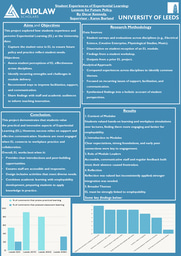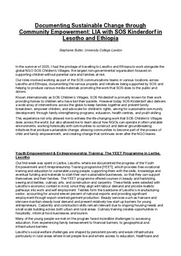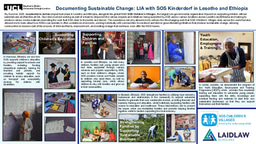Project Outline: Digitality and Deceit: The ECtHR’s Future in Approaching Digital Electoral Mis/Disinformation from Social Media Users

Digitality and Deceit: The ECtHR’s Future in Approaching Digital Electoral Mis/Disinformation from Social Media Users
Supervised by Dr Dimitrios Kagiaros, Durham University Law School
Project Summary
My research centres on the complex interplay of the European Court of Human Rights’s (ECtHR) approach to the rights of freedom of expression and free and fair elections. Article 10 of the European Convention on Human Rights guarantees freedom of expression, a democratic cornerstone. Article 3 Protocol 1 ECHR protects free and fair elections. One of the key challenges to resilient democracy is the proliferation of online mis/disinformation. While Article 10 protects the free flow of information, this needs to be balanced against the right to a free and fair election that is void of malicious online interference. My research examines the adequacy of the ECtHR’s current approach to harmful electoral information in a period of unprecedented digital change.
The increasing influence of non-political actors in electoral narratives is an equally intriguing and concerning topic to me, particularly considering recent developments in the ownership of hugely influential social media platforms. Part of my A-Level EPQ focused on the relationship between free speech and the right to privacy. Within this project, I am keen to explore free speech in the context of elections. My research largely centres on the balancing act required between these two provisions, to ensure viability in the time frame. I am eager to approach the topic from a ECtHR perspective, as this aligns with my career intentions in international law. The specific angle of my research offers insight into balancing human rights on a transnational scale, reevaluating the status quo considering the dynamic political climate.
Research Question, Background and Summary
The European Court of Human Rights is consistently tasked with balancing competing human rights. As Shattock demonstrates, one area where there is considerable need for a balancing act is between the right to freedom of expression and the right to fair and free elections. However, the digital age creates unique challenges to this balancing act. Non-political actors, such as Elon Musk, are increasingly capable of shaping political narratives using digital platforms. As Mhalla discusses, the institutional defences against this are alarmingly weak. In light of pressing recent developments, my research assesses the Court’s current approach to balancing competing human rights, and its adequacy in responding to digital challenges.
The use of digital platforms in the electoral process has profound implications relating to mis/disinformation. According to the Council of Europe’s definition, misinformation refers to verifiably false or misleading information disseminated without harmful intention. Disinformation refers to verifiably false or misleading information disseminated with harmful intentions .
ECHR Article 10 protects the right to freedom of expression and information. The right is not absolute but subject to limitations in specific circumstances. As outlined in Article 10(2), a State may be able to interfere where there is a legitimate aim, prescribed by law, and the interference is proportionate. Both political speech and journalistic expression are afforded high levels of protection by the Court.
ECHR Article 3 of Protocol 1 protects the right to free and fair elections. Textually, the right focuses on the people’s opinion in choosing the legislature. Digital mis/disinformation impacts this by preventing voters from accessing reliable and accurate information about parties and candidates.
The digital age presents unique problems to this intricate balancing act. Recent studies demonstrate that 87% of those surveyed feared the impact of disinformation on election campaigns and the votes of a significant proportion of voters. As the population becomes accustomed to social media as a primary news source, the potential for freedom of expression to impede the running of fair and free elections also increases.
Therefore, the question arises as to whether the Court’s established approach in mis/disinformation cases could adequately address the unique problems social media platforms pose during the election process. My report, “Digitality and Deceit: The ECtHR’s Future in Approaching Digital Electoral Mis/Disinformation from Social Media Users” re-evaluates the European Court of Human Right’s (ECtHR) existing approach to mis/disinformation to assess its adequacy to deal with the modern challenges created by digitality.
Research Objectives and Methodology
The overarching objective of my research is to revisit the human rights ramifications of electoral mis/disinformation in light of the developing role that digital platforms hold in elections.
This involves researching the Court's Article 10 case law using the Court's HUDOC online database. I will undertake the same research process to establish the Court's approach to Article 3 Protocol 1 cases. I will derive the standards the Court has developed when resolving conflicts between Article 10 and Article 3 Protocol 1 ECHR. This involves a doctrinal analysis of the existing case law to assess whether the Court's current approach is 'fit for purpose'. In the second stage of the project, these standards will be evaluated from the perspective of their ability to respond to the modern challenges of mis/disinformation. To carry out this evaluation, principles will be derived from the scholarship focusing on the perils of online disinformation. While digital electoral mis/disinformation has not been addressed at the Court level, other judgments provide context to the challenges posed by digital platforms.
The primary output of my research will be a report detailing my findings. My final report will also be added to the webpage of the Human Rights and Public Law Centre at Durham Law School to further disseminate my findings.
However, as I aim to promote a better understanding of resilient and transparent democracies, it is essential that my research findings can be understood outside the academic community. To support this, I intend to create either an audiovisual tool or a blog-style plain language summary of my research. My research centres heavily on the impact of digitality, and it would be most beneficial to utilise digital tools to convey my findings to a broader audience of those affected.
My research will naturally draw on interdisciplinary research, especially empirical studies aligned with media studies, to better understand the nature of digital platforms. For example, Ipsos recently conducted a series of surveys researching the average citizens understanding of disinformation and the effect that it is having on political narratives. Outside of the legal implications, my research is also highly applicable in political studies, as law-makers and government are intrinsically linked.
References
[1] Ethan Shattock, ‘Free and Informed Elections? Disinformation and Democratic Elections under Article 3 Protocol 1 of the ECHR’ (2022) 22(4) Human Rights LR 1.
[2] Rym Momtaz, ‘Taking the Pulse: Is Elon Musk Meddling in European Politics?’ (January 23 2025) Strategic Europe.
[3] Asma Mhalla in Rym Momtaz, ‘Taking the Pulse: Is Elon Musk Meddling in European Politics?’ (January 23 2025) Strategic Europe.
[4] Council of Europe, ‘Guidance Note on Countering the Spread of Online Mis- and Disinformation through Fact-Checking and Platform Design Solutions in a Human Rights Compliant Manner’ (Council of Europe 2024).
[5] European Convention on Human Rights, art 10.
[6] Handyside v UK (1976) Series A no 24; Lingens v Austria (1986) Series A no 103.
[7] European Convention on Human Rights, art 3 of protocol 1.
[8] Global Partners Digital, ‘Disinformation and Human Rights Explained’ (1 June 2023) <https://www.gp-digital.org/a-human-rights-based-approach-to-disinformation/> accessed 29 December 2024.
[9] Ipsos, ‘A Global Survey on the Impact of Online Disinformation and Hate Speech’ (Ipsos and UNESCO 2023) <Survey on the impact of online disinformation and hate speech> accessed 2 February 2025.
[10] European Court of Human Rights HUDOC Database <HUDOC - European Court of Human Rights> accessed 2 February 2025.
[11] Human Rights and Public Law Centre at Durham Law School <Human Rights and Public Law Centre - Durham University> accessed 2 February 2025.
[12] Ipsos, ‘A Global Survey on the Impact of Online Disinformation and Hate Speech’ (Ipsos and UNESCO 2023) <Survey on the impact of online disinformation and hate speech> accessed 2 February 2025.





Please sign in
If you are a registered user on Laidlaw Scholars Network, please sign in